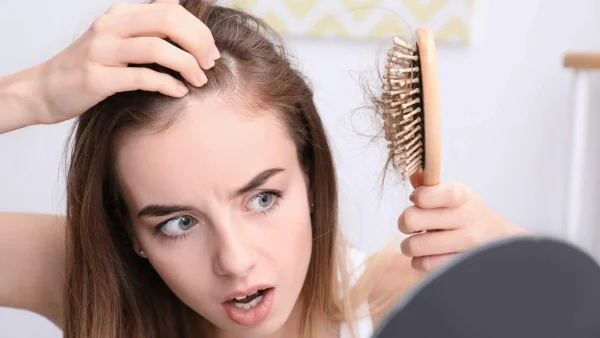
Radiation therapy is a common treatment for various types of cancer, using high-energy particles or waves to target and destroy cancer cells. While effective in treating cancer, it can come with side effects, one of the most noticeable being hair loss. This article explores the connection between radiation and hair loss, the factors that influence its occurrence, and potential solutions to manage or prevent it.
Does Radiation Cause Hair Loss?
Yes, radiation can cause hair loss, but the extent and severity depend on several factors:
1. Treatment Area
Hair loss due to radiation occurs only in the areas where the radiation beams are directed. For example:
- If radiation is directed at the scalp, hair loss on the head is likely.
- Radiation to the chest or other parts of the body will not typically cause hair loss on the scalp but may affect body hair in the treated area.
2. Radiation Dose and Intensity
- Higher doses of radiation are more likely to damage hair follicles and lead to hair loss. Lower doses may cause thinning rather than complete hair loss.
3. Duration of Treatment
- Prolonged radiation therapy sessions increase the likelihood of hair loss because of the cumulative damage to the hair follicles.
4. Individual Sensitivity
- Everyone reacts differently to radiation therapy. Some individuals may experience significant hair loss, while others might only notice mild thinning.
How Does Radiation Therapy Work?
Radiation therapy uses high-energy beams, such as X-rays, gamma rays, or proton beams, to damage the DNA of cancer cells, preventing them from growing and dividing. While it is highly targeted, radiation can also affect healthy cells near the treatment site, leading to side effects such as inflammation, skin changes, and hair loss.
Managing and Coping with Radiation-Induced Hair Loss
1. Preventive Measures
- Shielding the Scalp: If possible, discuss with your oncologist whether shielding techniques can be used to protect nearby hair follicles.
- Cold Caps: Although primarily used in chemotherapy, cooling caps can sometimes help reduce the risk of hair loss by reducing blood flow to the scalp during treatment.
2. Hair Care During and After Treatment
- Use gentle, sulfate-free shampoos and conditioners to minimize irritation to sensitive skin.
- Avoid heat-styling tools, chemical treatments, and harsh brushing.
- Protect your scalp from sun exposure by wearing a hat or using sunscreen.
3. Embracing Temporary Solutions
- Wigs, scarves, and hats can help maintain confidence and comfort during hair loss.
- Eyebrow pencils or temporary tattoo brows can mimic the appearance of lost facial hair.
4. Medical and Cosmetic Options for Regrowth
- Topical Treatments: Minoxidil (Rogaine) may sometimes help stimulate hair regrowth.
- Platelet-Rich Plasma (PRP): PRP therapy involves injecting platelets into the scalp to encourage hair follicle repair.
- Hair Transplants: For permanent hair loss, surgical options like hair transplants can restore hair in the affected area.
5. Emotional Support
- Hair loss can take an emotional toll. Joining support groups or speaking with a counselor can provide comfort and coping strategies.
Frequently Asked Questions About Does Radiation Cause Hair Loss?
1. Does radiation always cause hair loss?
No, radiation does not always cause hair loss. Hair loss occurs only in the area being treated with radiation. For instance, radiation targeting the scalp can lead to hair loss on the head, while radiation to other parts of the body won’t affect scalp hair.
2. Is hair loss from radiation permanent?
Hair loss from radiation can be temporary or permanent. Temporary hair loss often occurs with lower doses of radiation, and hair typically grows back after treatment ends. However, higher doses may cause permanent damage to hair follicles, leading to permanent hair loss in the treated area.
3. How soon does hair loss start after radiation therapy begins?
Hair loss usually begins within 2 to 3 weeks after starting radiation therapy. The rate and extent of hair loss depend on the radiation dose and the treatment area.
4. Will hair grow back after radiation therapy?
In most cases, hair begins to grow back a few weeks to months after completing treatment. However, the new hair may initially have a different texture or color. If the radiation dose is very high, hair regrowth may not occur in the treated area.
5. How does radiation hair loss differ from chemotherapy hair loss?
Radiation-induced hair loss is localized, meaning it only affects the area being treated. In contrast, chemotherapy often causes hair loss all over the body because it targets rapidly dividing cells, including hair follicles across the scalp and body.
6. Can I prevent hair loss from radiation therapy?
Hair loss from radiation is difficult to prevent, as the treatment directly affects the hair follicles in the targeted area. Some cooling caps or scalp-protection measures used during chemotherapy are less effective for radiation-induced hair loss.
Final Thoughts
Radiation therapy can cause hair loss, primarily in the treated area, and its severity depends on factors like treatment location, dose, and duration. While the experience of hair loss can be distressing, understanding its causes and exploring options for management or regrowth can provide relief. If you’re undergoing radiation therapy, discuss your concerns with your healthcare provider to explore preventive measures and post-treatment solutions. With the right support and care, you can navigate this challenging aspect of your treatment journey.

Leave a Reply